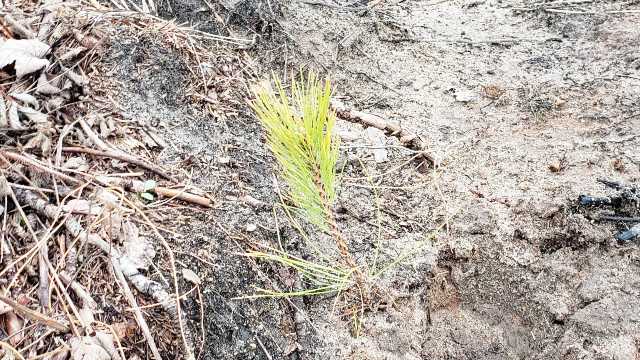By Jerry Grossman
Tahquamenon Area Schools recently had 3,180 red pine trees planted on its school forest near the Canada Lakes trail. The lot had been clearcut two or three years ago, and the district netted the proceeds. New seedlings were planted in trenched rows, with tiny trees about 5.5 feet apart.
Replanting the lot was a largely local effort: The trees were grown by Evergreen Nursery in Rumely and hand planted by Timberland Forestry Services from Munising. Site preparation work was completed by Holli Forest Products from Ishpeming and Wildlife & Wetlands Solutions from South Boardman. The project was administered by Grossman Forestry Company located in Newberry in cooperation with the school forester, Dan Farnsworth.
Funding for the project was provided by the U.S. Forest Service and Arbor Day Foundation through the Great Lakes Restoration Initiative (GLRI). Planting trees helps protect water quality because Michigan’s urban and rural forests reduce pollution and provide clean water. A total of ten schools across Michigan are planting 110,000 trees in their school forests to protect water quality, enhance diversity, and produce future income for the school.
All ten participating schools have a forest stewardship plan to manage, protect and help students enjoy their school forest. The school forests are “Certified Family Forests” through the American Tree Farm System to show their commitment to transparent and sustainable management of these public forests.
Tahquamenon Area Schools has 220 acres of forest in five distinct tracts. The first tracts were acquired in 1930 from the Fibron Land Company and the Newberry Lumber and Chemical Company. Two tracts were later acquired from the State of Michigan in the 1950s, and the last tract was acquired from the Quinlan Family in 1995. The management goals are to use the property for educational purposes, maintain healthy productive forests, generate short term and long term revenue, improved wildlife habitat and provide recreational opportunities.
Superintendent Stacy Price said the district appreciates the forest tracts, and when the lots can be logged, the money is a bonus to the district.
“We are proud to be a partner in these efforts of active forest stewardship in Michigan,” said Bob Lueckel, USDA Forest Service Deputy Regional Forester. “Through our grant programs, we provide funding for states and others who are working on local, effective forest restoration projects. This project is doing that, and also teaching the next generation of forest stewards.”
Dan Lambe, the president of Arbor Day Foundation says, “At the Arbor Day Foundation, we aim to inspire the next generation of tree planters. A lifelong passion for the environment and nature starts from a young age, and these ten schools in Michigan are ensuring just that. We applaud the steps taken by these schools along with the Michigan DNR to cultivate and educate the next generation of tree planters.”












